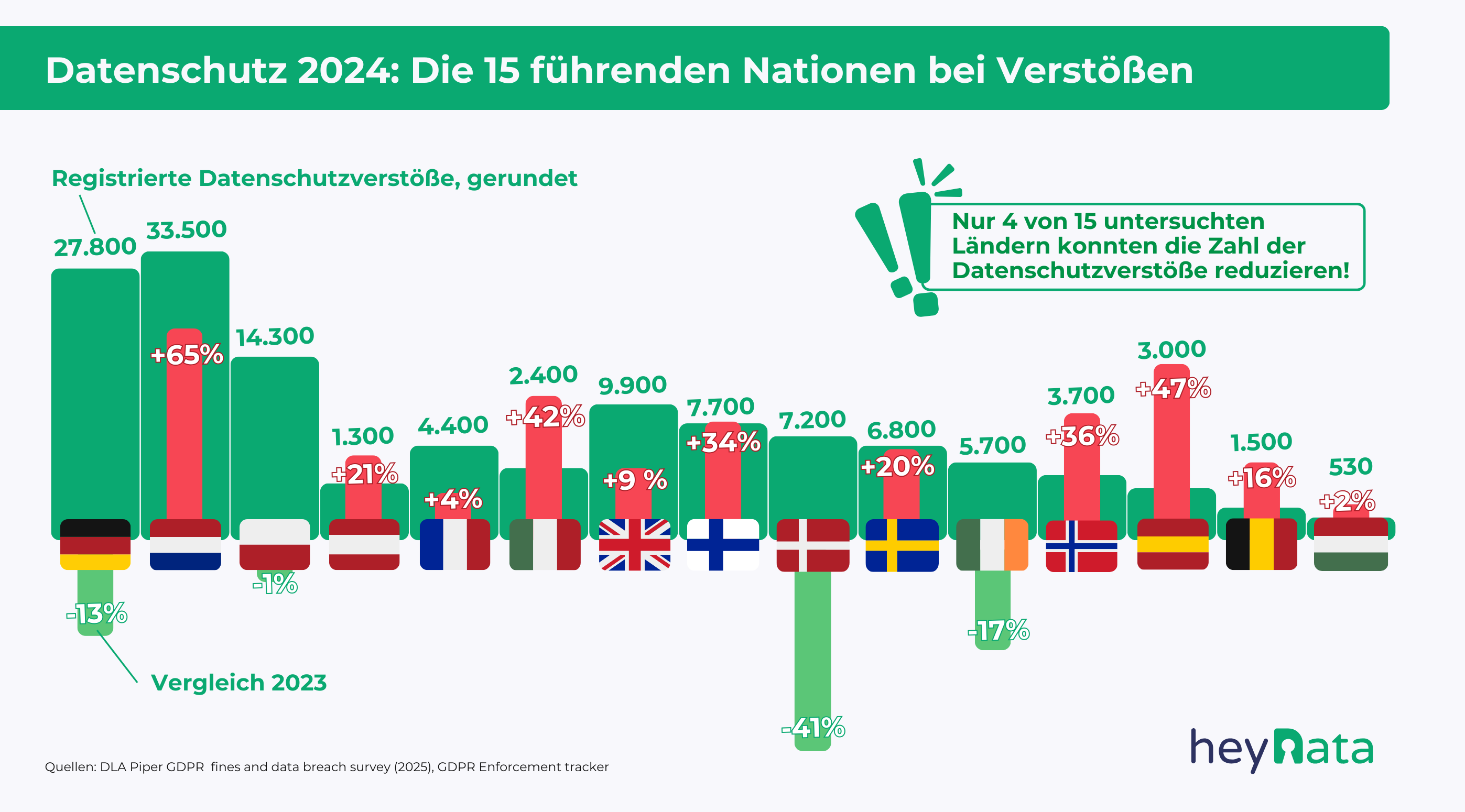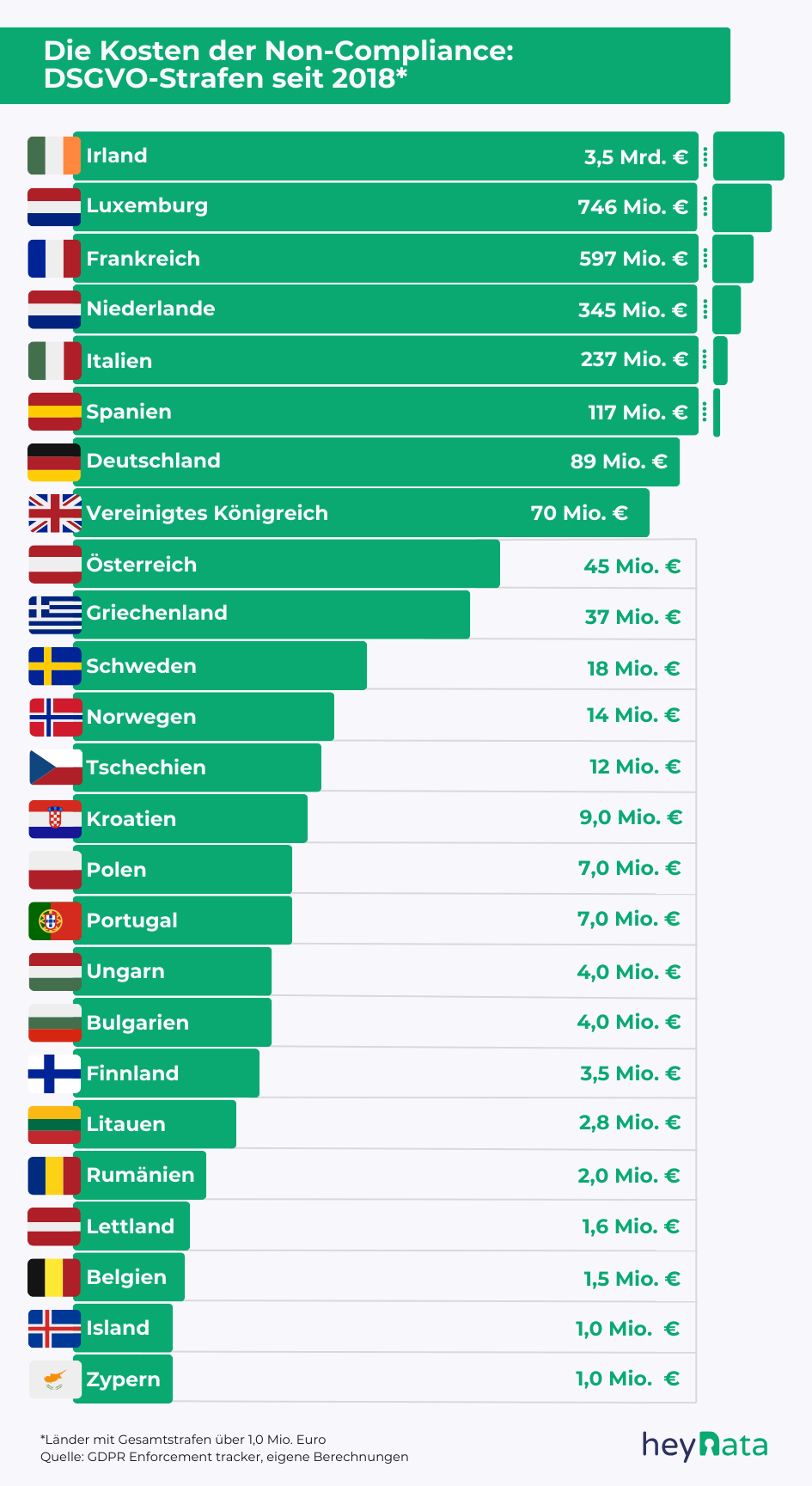
Data Protection Breaches: A Critical Year 2024
The year 2024 marked a low point in terms of data protection in Europe. Despite strict regulations and ongoing efforts to ensure secure data handling, a worrying trend emerged: the majority of GDPR nations not only recorded thousands of data breaches, but an alarming increase in such incidents compared to the previous year.
This negative trend not only reveals persistent weaknesses in protection systems, but also underlines the urgent need for more effective security measures in companies and public institutions and targeted advice.
The integrity of personal data and consumer trust are exposed to serious risks - a situation that is no longer acceptable in our increasingly digitalized world.

A positive trend is emerging in Germany: the number of registered data protection breaches was reduced by 13% compared to the previous year. This indicates that efforts to improve data protection measures are bearing fruit and compliance is being strengthened.
Despite this decline, Germany remains one of the countries with the highest number of data breaches in Europe with 27,829 recorded cases. Only the Netherlands, with 33,471 reported incidents, recorded even more cases – a particularly striking figure, also in relation to the country's comparatively small population.
One possible explanation for this could be the high overall digital maturity of Dutch society, combined with active data protection supervision and a low threshold for reporting incidents. A tendency towards a stricter interpretation of the GDPR could also contribute to more breaches being registered and reported.
In any case, the figures underline the need for all affected nations to further improve their data protection practices and consistently monitor compliance with the legal requirements.
Comparison in Europe: Who is Making Progress?
In the analysis of 15 EU countries, Norway and the United Kingdom, only three other nations besides Germany were able to reduce their data protection breach figures. The most significant decrease was recorded in Denmark, where the number of registered breaches fell by 41 percent compared to the previous year. In Ireland, the number of breaches fell by 17 percent (5,730 cases in 2024) and in Poland by one percent (14,286 cases).
The decline in data breaches can be explained by various factors. It is possible that improved compliance strategies, strengthened by investments in data protection technologies and employee training, have played a key role. Increased awareness of data protection issues and stricter enforcement of the General Data Protection Regulation (GDPR) by the authorities could also have contributed to the reduction.
However, it remains an open question whether this decrease is also partly due to a lower detection rate or changes in reporting practices. An in-depth investigation of additional qualitative data would be necessary to precisely determine the causes and assess the actual improvement in data security.
Increase in Breaches in Austria
In Austria, on the other hand, the number of data breaches rose by 21 percent. With a total of 1,282 registered cases, the country recorded a significant increase compared to the previous year. This increase could indicate gaps in the implementation of data protection measures, possibly an increased willingness to report or a tightening of regulatory requirements that have brought more breaches to light.
In some European countries, the situation regarding data breaches is particularly worrying. The Netherlands is leading the way with a drastic increase in reported cases. In 2024, a total of 33,471 data breaches were registered there, an increase of 65% compared to the previous year.
Spain and Italy also recorded significant increases in the number of breaches. In Spain, incidents rose by 47 percent to 2,989 cases, while Italy saw an increase of 42 percent with a total of 2,400 cases. These developments could indicate that, despite existing data protection laws, there are considerable challenges in the practical implementation of and compliance with the regulations.
Swiss Data Protection Innovations: Waiting for Reliable Breach Figures
With the revision of the Swiss Data Protection Act (revDSG) in 2023, Switzerland has taken significant steps to modernize its data protection standards and align them with international norms, in particular those of the European General Data Protection Regulation (GDPR). This alignment has also been recognized as equivalent by the EU, making compliance with these new regulations an important pillar in cross-border data flows.
Despite this important legal reform, no comprehensive data on data breaches in Switzerland has been published to date. This not only makes direct comparability with the GDPR statistics of EU member states difficult, but also raises questions about the effectiveness of enforcement and the transparency of the new regulations. The implementation of the revDSG and the lack of reliable breach data underline the need for increased monitoring and reporting to ensure that the revised law is not just on paper, but effective in practice.
Data Protection in Crisis Mode
The rising numbers in these countries underline the need for an intensified effort to improve data protection practices. They show that compliance with the GDPR and national data protection standards remains a critical area that requires ongoing attention and resources.
GDPR Fines in Europe: A Record of Significant Fines
Since the introduction of the General Data Protection Regulation (GDPR) in May 2018, the competent authorities have imposed penalties, some of them severe, for breaches of these comprehensive data protection rules. This has affected not only private companies, but also public institutions.

Rigorous Enforcement for Data Protection Violations
Ireland, home to many European headquarters of large technology companies, has the highest fines with a total of €3.5 billion. A significant proportion of this sum is due to the record €1.2 billion fine imposed on META in May 2023, supplemented by further large fines on companies such as TikTok and LinkedIn. This concentrated imposition of fines has had a major impact on Ireland's position in the fining statistics.
In Germany, the fines imposed over the last seven years amount to 89 million euros. The majority of these fines are less than 100,000 euros. Those fined include hotels, restaurants, medium-sized craft businesses and online retailers, as well as larger institutions such as a university hospital and several police officers who have also committed violations.
In Austria, fines totaling 45 million euros were imposed in the same period. One outstanding case was the partly state-owned Österreichische Post AG, which was fined 9.5 million euros. It had failed to allow data protection requests to be made by e-mail.
This high fine underlines the strict enforcement of GDPR regulations by the Austrian authorities. Despite some high individual cases, most infringements in Austria were punished with fines of less than 10,000 euros, indicating that many of the infringements identified were classified as less serious.
GDPR: A Key Pillar of European Data Protection
The consistent application of the GDPR by authorities in Europe demonstrates the EU's serious attitude towards data breaches and the desire to protect citizens' rights. The penalties imposed, especially in countries with major technology hubs, serve as a clear signal to all companies that compliance with data protection rules is a top priority. This underscores the need for organizations to continually review and improve their privacy practices to not only ensure compliance, but also to increase public confidence in their business operations.
Looking ahead, it is likely that the GDPR will continue to play a central role in the European data protection landscape, encouraging organizations to keep their data protection strategies up-to-date and effective.
Sources used and further reading:
- Report DLA Piper GDPR fines and data breach survey (January 2025)
- Database GDPR Enforcement tracker


